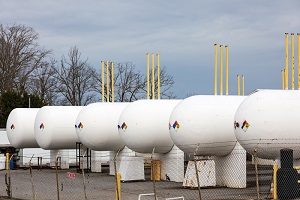
Pollution Concerns for Gas Hauling & Storage Businesses
Businesses handling, storing, and transporting gases have complicated pollution exposures. While these companies may believe that the risk is low because certain gases are considered non-toxic and will dissipate quickly, there are actually many inherent dangers involved with managing gaseous substances.
Environmental exposures for companies hauling or storing gas:
Generally the concern with these insureds is over the risk of explosion from mishandling or over-pressurization. From a pollution perspective, the exposures may involve the environmental impact after an explosion occurs, including ignition of materials that release toxic fumes when they burn, natural resource damages, bodily injury, and the chemicals in firefighting foam used to extinguish any fire that occurs.
Mishandling or the erroneous delivery of these products may also cause a release, as well as tank leaks resulting from problems with temperature or corrosion. Lastly, releases may occur from the failure of mechanical components such as valves and sensors.
Examples of pollution concerns for gaseous substances may include, but are not limited to:
- Propane, in addition to being highly flammable, can be dangerous if inhaled.
- Natural gas can be a pollutant to both air and water, with methane being the biggest concern.
- Hydrogen is also highly flammable and embrittlement, or loss of ductility, is one of the main issues concerning safety and leaking risk.
Coverage for Businesses handling gaseous substances:
Contractors Pollution Liability
Contractors Pollution Liability insurance (CPL) is coverage designed to protect from third party claims for damages caused by “Pollution Conditions” arising from the insured’s covered operations. This may include employees who transport and load/unload gaseous substances.
Contractors Pollution Liability/Professional
The Contractors Pollution Liability/Professional Policy is a combined Pollution and Professional coverage form. It provides coverage to a contractor handling gaseous substances who has an E&O exposure from their professional services, as well as a pollution exposure from any jobsite/project management operations.
Site Pollution Liability
Site Pollution Liability insurance is designed to cover claims arising from pollution releases at, on, or emanating from a specific scheduled location, including business locations that house tanks and trucks.
Workers Compensation
A Workers Compensation policy provides coverage for an employer’s exposure arising out of job-related injury/death resulting from an accident or occupational disease sustained by employees.
Auto Coverage
Automobile insurance coverage is typically required for most businesses; an Auto policy including Pollution is an ISO based Auto form including broadened pollution endorsements and any motor carrier filings.
Follow Form Excess Liability
If underlying General Liability, Pollution and/or Professional Liability is offered, a Follow Form Excess policy is also available. The Follow Form Excess will go over the qualifying environmental coverage lines, as well as the underlying Auto and Employers Liability if applicable.
News stories involving pollution and gas companies:
Failure of gas distribution system caused explosion
In September 2018 Columbia Gas of Massachusetts, a company which supplied gas to the Merrimack
Valley towns of Lawrence, Andover and North Andover, failed to stop the over-pressurization of a gas distribution system, leading to a number of fires and explosions. One person was killed, 22 were injured, and thousands were forced to evacuate their homes. In 2020, the company agreed to pay a $53 million fine and sell its business in the state.
https://www.nytimes.com/2020/02/26/us/columbia-gas-massachusetts.html
Family claims negligence, files $500 million lawsuit after fatal house fire
Relatives of the couple who died after a house fire near San Benito on Christmas Day have hired an attorney and filed a $500 million lawsuit alleging negligence. The plaintiff said Hino Gas should never have filled up the propane tank, which he claims was improperly positioned and installed.
https://www.valleycentral.com/news/local-news/family-claims-negligence-files-500-million-lawsuit-after-fatal-house-fire/
Hydrogen could fuel U.S. energy transition. But is it safe? Hydrogen emits no carbon dioxide when burned and is increasingly seen as a way to reduce the risk of climate change. But if it gets blended into the country’s energy mix at a large scale, hydrogen will raise some safety risks. Hydrogen can ignite more easily than natural gas and its flame is nearly invisible. It can also make steel brittle in pipelines, which can lead to leaks and ruptures.
https://www.eenews.net/articles/hydrogen-could-fuel-u-s-energy-transition-but-is-it-safe/
Natural gas is a dangerous name for a climate pollutant Natural gas is almost entirely made up of methane, a colorless, odorless gas that produces few pollutants when burned. But some climate advocates have already dropped the “natural” moniker in their legal filings, advertising, and communications, when talking about natural gas and the associated methane. They favor calling it “fossil gas” or “methane gas” — anything that’s more descriptive for a dangerous and explosive substance.
https://www.vox.com/22912760/natural-gas-methane-rename
Lebanon hotel explosion caused by fire and propane leak
An electrical fire and propane leak caused an explosion at the Element Hotel in Lebanon, which injured eight guests and two firefighters. The hotel faced extensive internal and external damage and, according to the Lebanon Fire Department, cannot be safely reoccupied at this time.
https://www.unionleader.com/news/safety/lebanon-hotel-explosion-caused-by-fire-and-propane-leak/article_a89dd768-930d-53c9-b682-0ae58951b628.html
For more information or to discuss coverage for a gas hauling or storage business, please contact us at (800) 596-2156 or info@b-h-a.com.
Sources:
https://www.pv-magazine.com/2022/02/07/large-scale-storage-options-for-compressed-hydrogen/
https://www.nytimes.com/2020/02/26/us/columbia-gas-massachusetts.html
Type: Blog
Topic: Haulers